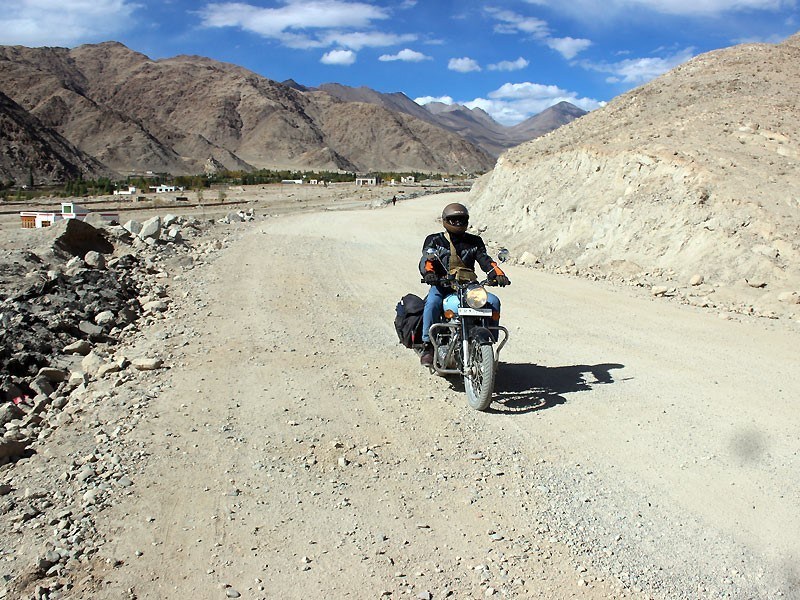
In recent years, there has been a loud talk about the fact that every person’s life has been increasing in the number of factors that cause ill health. Both mental and physical health are two issues that we neglect more and more often. Stress, the rush for career and success, or the increasing number of hours spent on the Internet do not promote the affirmation of life and general happiness.
Each of us deals with problems and stress in his or her favourite way. If you are here and you read this article there is a good chance that yours is, among others, riding a motorcycle. Have you ever wondered whether this inconspicuous activity is a universal tool for achieving harmony in life? Here is the scientific evidence that it is!
If you find this text valuable and know someone to whom this knowledge could be useful, send it on! After all, mental health – let’s not be afraid of the term – right next to physical health are aspects of your “I” that you should take care of every day.
Motorcycle – a universal over-the-counter medicine
If you have turned off the gas cuff at least once, you know how much endorphins and adrenaline your body produces while riding a motorcycle. Each of us is able to gather a handful of positive emotions experienced behind the wheel of a motorbike.
In the USA, among motorcyclists (and not only) there is a popular term for wind therapy, which adds to the pool the contact with the element. There is less talk about it in Poland – I personally did not meet this term before I started to complete the information for this article. Perhaps it is a matter of nomenclature itself, but every motorcyclist will rather be able to imagine what it is about.
But the question arises. Are such experiences not subjective by any chance? Can some people simply not be affected by riding a motorbike?
The study involved 50 healthy motorcyclists who, using their own motorcycles (in normal weather and road conditions), had to cover a distance of about 35 kilometres (exactly 22 miles). Both before and after the marked route, all the men underwent hormone tests. Additionally, during the ride, each of them was monitored by an EGF device, which measures the electrical activity of the brain.
The results of the tests were fascinating, although for experienced motorcyclists – somewhat obvious. After only 35 kilometres, stress levels dropped by 28 per cent, heartbeat increased by 11 per cent and adrenaline levels increased by 27 per cent. In addition, the concentration of the bikers also increased and their overall well-being was much better than before the study.
It is worth noting that, for comparison, the motorcyclists crossed the same route for the second time, but with their own cars. The results were not even half as good as those obtained after the motorcycle ride.
Riding a motorcycle and post-traumatic stress disorder
You already know the results of research confirming the great benefits of riding a motorcycle. Nevertheless, they only concern everyday problems of “ordinary” people. And what about really serious disorders that are difficult to deal with?
One of them is post-traumatic stress disorder (PTSD). The everyday life of people affected by this disorder – most often veterans and victims of drastic accidents – can be really hard to deal with. The way to deal with it turns out – and how! – riding a motorcycle.
American veterans affected by PTSD recommend riding a motorcycle as one of the most effective ways to deal with the symptoms of the disorder. According to them, the main advantages of riding on a motorcycle are the feeling of deep serenity, relatively fast approaching calmness (35 km – the above research) and the possibility to build relationships with other motorcyclists.

Riding a motorcycle and ageing and intelligence.
Japanese scientist Ryuta Kawashima began research on the impact of motorcycle riding on the aging process and the natural tendencies of the human brain, which decreases with age.
The comparison group included 22 men aged 40-55 years. All of them were ex-motorcyclists, i.e. they had a relevant driving license, but had not driven a motorcycle for at least 10 years. At the beginning of the study, each of them completed a test to check their brain performance and intelligence. Then half of the former motorcyclists commuted daily in motorcycles for two months, while the other half did not change their habits and used other means of communication.
Once again, the results of the test turned out to be fascinating. The cognitive functions of the motorcycle group improved significantly and the results of the same test increased by 50 percent! Interestingly, the results of the second group not only did not increase, but slightly worsened.
Motorcycles are also good for physical health
Probably not once after a long ride you experienced pain in your back, neck and hands. In that case, how can you even talk about the health benefits of riding a motorcycle? It turns out that if you meet several conditions – you can!
The positive impact of motorcycle riding on your health will depend primarily on the correct position/tilt of the handlebars and footrests and the size of the motorcycle to your height. No less important is also the shape of the seat. If you do not meet these conditions, your position behind the wheel will be inappropriate, which will affect the condition of your spine and neck.
Of course, some factors cannot be overstated. The helmet weight and wind pressure (especially at high speeds on a motorcycle without windshields/wings) will always accompany you. Nevertheless, adjusting the settings of the motorcycle’s moving parts and keeping an eye on the right position behind the handlebar will result in a strengthening of the spinal cord over time.
You already know all the mental and physical health benefits of riding a motorcycle. Now answer honestly the question – Have you heard about them before? If not, what do you think – why?
Unfortunately, but in most of the messages – especially in traditional media – we can encounter demonization of the motorcycle world. To a large extent, the media focus on the dangers of riding a motorcycle and the motorcyclists themselves, who sometimes exhibit irresponsible behaviour on the roads.
Of course, at a time when the media are based on cheap sensations, it is easy to pin the wrong patch on motorcycles. Riding on a wheel 200 km/h through the city centre? Crazy donors caused another accident?
One cannot ignore the fact that rotten apples are found in every group. Just as with a motorcycle, a car or a bicycle, you can be a danger on the road and this is an undeniable topic. It’s only a pity that the media are giving a clear message “Motorcycles are evil” (the same is true of quads), not to mention the advantages – so that the recipient can decide whether or not the tracks fit him or her.
This is quite sad because, apart from the aspect of health benefits, I think everyone will agree with me that having a motorcycle is one of the greatest adventures you can have in your life.
